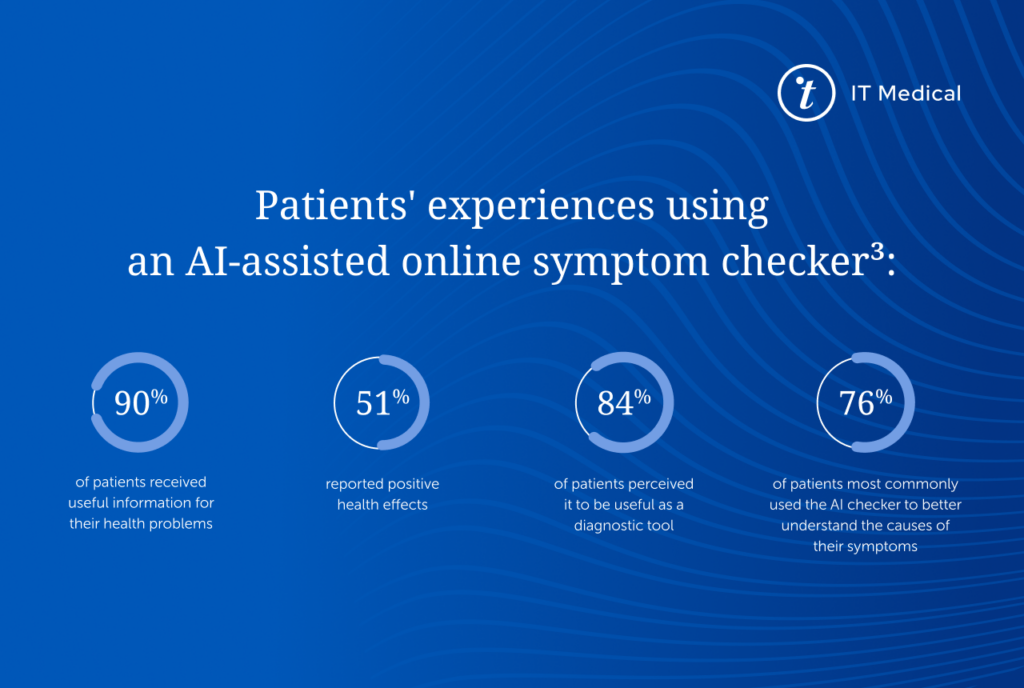
The progress in artificial intelligence (AI) is reshaping patient care, across various dimensions, from facilitating faster discharge to curating treatment plans and suggesting lifestyle changes. However, one of the most notable benefits the medical staff and patients can realize quickly is how AI can help enhance patient engagement.
The AI-powered assistants not only relieve healthcare providers’ workloads but also improve treatment outcomes. After all, the research shows that patients with lower engagement are three times more likely to have unmet medical needs and twice as likely to postpone seeking medical care1. Patient engagement is a combination of activities that can be provided by AI tools that guide patients through testing procedures, treatment plans, and insurance claims.
Moreover, the research shows that AI digital assistants — ranging from chatbots to virtual health assistants — can significantly reduce the workload of medical staff by lowering readmission rates. All this is thanks to AI assistants that help improve treatment adherence by providing patients with personalized, continuous support.
The Need for AI in Patient Engagement
Patient engagement is a well-documented predictor of healthcare outcomes.
A study2 found that the patient engagement factor was linked to reduced hospital readmission rates, which account for a large share of U.S. healthcare expenses. Annually, more than $52.4 billion is spent on patients who are readmitted within 30 days for conditions they had previously been treated for. However, when patients actively engage with their health information and communicate with providers online, they are more likely to understand their clinical details, adhere to treatment plans, and manage their conditions effectively after discharge.
Moreover, the call centers and online chatbots are not as elaborate as advanced AI Assistants which are equipped with advanced problem-solving capabilities, are free of language barriers, and have no timing constraints.
AI-driven solutions aim to tackle this by offering tailored, accessible support that keeps patients engaged throughout their healthcare journey.

Virtual Health Assistants: Personalized, Data-Driven Support
AI-powered virtual health assistants use advanced algorithms to provide interactive, real-time health guidance. These tools pull data from wearables and electronic health records to offer personalized health recommendations. For instance, a diabetes-focused AI assistant can analyze blood glucose levels, guide patients through complex testing procedures of GI tests, or monitor mood patterns to adjust care recommendations for mental health assistance.
According to a recent study by Accenture, AI-driven healthcare could save the U.S. up to $150 billion annually by 2026, especially by reducing administrative costs, automating patient education, and improving adherence to care plans.
Addressing Health Disparities Through AI
AI-powered assistants also address disparities in healthcare access by providing continuous, support regardless of the location of the patient. With 57 million rural Americans facing limited healthcare access, AI-powered assistants have the potential to provide essential, 24/7 support.
Virtual assistants allow these patients to receive essential medical guidance without travel, reducing the need for time off work and costly transportation.
Patients in rural areas using AI-powered symptom checkers can assess their health concerns remotely and receive guidance on whether an in-person visit is necessary. This minimizes unnecessary travel for patients who might face long distances to healthcare facilities.
Moreover, AI-driven solutions offer a consistent level of care that helps reduce bias and promotes equity. Traditional healthcare settings have shown unconscious bias to affect patient care, especially among minority groups. AI, if developed and monitored inclusively, can provide more impartial support, which is essential for reaching underserved populations. Virtual assistants can play a critical role in eliminating biases and ensuring equitable treatment for all patients.

Operational Benefits for Healthcare Systems
Healthcare providers also benefit from AI tools, as they can manage routine tasks like answering common patient questions and scheduling appointments, reducing clinicians’ workloads. McKinsey & Company reports that hospitals implementing AI tools have experienced up to a 25% reduction in administrative expenses.
Another advantage is the potential reduction in clinician burnout. Studies have shown that administrative and repetitive patient education tasks contribute to high burnout rates among healthcare providers. By automating patient inquiries and follow-up reminders, AI tools relieve clinicians of these responsibilities, allowing them to focus on complex cases. This reduction in workload not only boosts staff satisfaction but also improves patient outcomes, as providers are better able to focus on direct, high-impact patient care.
Implementation Challenges and the Road Ahead
Despite these benefits, implementing AI-powered tools in healthcare requires careful consideration of data security, patient acceptance, and ethical implications. Data privacy remains a top concern; robust security protocols are essential to safeguard patient information during AI interactions. Furthermore, educating patients on the purpose and scope of AI in their healthcare journey is crucial for fostering trust.
The Future of Patient Care with AI-Powered Assistants
AI-powered healthcare assistants are proving to be transformative assets in modern healthcare.
Explore our comprehensive whitepaper to learn more about the benefits and evidence supporting AI in patient care. At IT Medical, we are dedicated to advancing healthcare through cutting-edge AI solutions. Visit our website to learn more about how we can help your organization implement these innovations for a more resilient and efficient healthcare future.
1 Hibbard JH, Cunningham PJ.: “How engaged are consumers in their health and health care, and why does it matter?” Res Briefs. 2008;(8):1–9.
2 Is the Hospital Value-Based Purchasing Program Associated with Reduced Hospital Readmissions?
3 Meyer AND, Giardina TD, Spitzmueller C, Shahid U, Scott TMT, Singh H. Patient Perspectives on the Usefulness of an Artificial Intelligence-Assisted Symptom Checker: Cross-Sectional Survey Study. J Med Internet Res. 2020;22(1):e14679. doi:10.2196/14679







